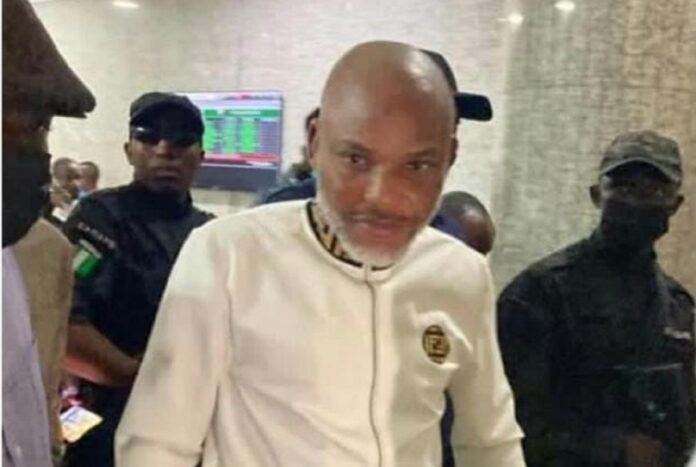By Njoku Jude Njoku, Esq.
A Historical Pattern of Suppression
It appears that any Nigerian who dares to question British iron-clad control over our destiny inevitably ends up behind bars—whether during the colonial era or under the neo-colonial surrogates now ruling through the All Progressives Congress (APC).
This is no coincidence. It is a continuum.
From Herbert Macaulay, jailed in 1929 for challenging colonial injustice, to Nnamdi Azikiwe, detained multiple times in the 1940s and 1950s; from Chief Obafemi Awolowo, imprisoned in 1962 on questionable treason charges, to Anthony Enahoro, hounded into exile for daring to propose true federalism; from Ken Saro-Wiwa, executed in 1995 for defending the Ogoni people—Nigeria’s history is replete with voices of conscience criminalized by powers allergic to truth.
Today, Mazi Nnamdi Kanu joins that long list. His only “crime” is speaking through a microphone, not wielding a gun. Yet the state brands his words as terrorism.
- The Mind Game of Neo-Colonial Control
The British, masters of psychological manipulation, long perfected the art of engineering the minds of Africans into perpetuating their own subjugation. They understand how to build obedient elites—“house slaves” who will defend their chains with patriotic fervour.
That same mind game continues today. Those who rule Nigeria under the guise of national unity are often little more than stewards of a colonial estate.
Kanu threatens this structure. His call for self-determination, justice, and equity undermines the architecture of control Britain left behind—one sustained by division, dependency, and docility.
- Microphone Terrorism vs. Bullet Terrorism
The absurdity is glaring: in Nigeria, “terrorism with a microphone” is an unforgivable sin, while terrorism with guns and bullets is rationalized, negotiated with, and often rewarded with political appointments.
If mere speech now constitutes terrorism, then our entire nationalist movement—from Macaulay to Azikiwe—was built on terrorism.
The real threat Kanu poses is not violence but consciousness. He reminds Nigerians that dignity and justice are non-negotiable. That is why he must be silenced.
- The Legal Farce and the Politics of Fear
Since his illegal rendition from Kenya in 2021—an act Nigeria’s own courts deemed unlawful—Kanu has faced a battery of 15 counts, from treasonable felony to incitement, all arising from his broadcasts on Radio Biafra.
Despite years of detention and multiple court orders for his release, the government persists, hiding behind endless adjournments and politically tailored “medical verifications.”
On October 8, 2025, the Federal High Court adjourned again to October 16, pending a report from the Nigerian Medical Association on his deteriorating health. Meanwhile, his trial—dragging on for over four years—remains a glaring mockery of due process.
Critics like Omoyele Sowore call this a “judicial hostage situation,” exposing how state power is weaponized to crush inconvenient voices rather than uphold justice.
- The Atiku Intervention: Cracks in the Wall
Alhaji Atiku Abubakar’s intervention has unsettled the establishment. On October 9, he joined Sowore in calling for Kanu’s unconditional release, describing the detention as “an open sore on our nation’s conscience and a stain on our belief in the rule of law.”
This marks a rare moment of clarity from the political class—proof that some northern leaders still recognize that peace and development are impossible without justice.
Atiku’s statement builds on his earlier calls for political resolution in 2023 and 2024, and it has electrified public discourse. A nationwide #GreatMarchForMNK is now scheduled for October 20, rallying Nigerians across divides to demand Kanu’s freedom.
- The Unfolding Irony: History Repeats Itself
It is profoundly instructive that the Tinubu regime, only yesterday, acknowledged the injustices visited upon our founding fathers by the British.
The same regime now perpetuates that very injustice against Mazi Nnamdi Kanu.
History, it seems, moves in circles.
Herbert Macaulay yesterday. Nnamdi Kanu today.
The story is the same, and the history inescapable.
Kanu will one day be celebrated, not condemned—because time, the greatest judge of all, has always vindicated those who stood on the side of truth.
- The Dawning Possibility of a Broader Struggle
If this peaceful march organized by Omoyele Sowore succeeds, it may open a new chapter not only for Mazi Nnamdi Kanu but for the soul of Nigeria itself.
For the first time, the struggle for justice may transcend geography and ethnicity—becoming a banner for every downtrodden man and woman across this wounded nation.
Perhaps Kanu’s vision will expand beyond Biafra, to embrace all who have been relegated to the fringes of economic development and abandoned by a parasitic political order that feeds on the misery of the masses.
In that moment, his microphone will no longer speak only for a people, but for all people crushed by injustice.
Sowore stands on the threshold of achieving something that ten years of incarceration and twenty years of persecution could not accomplish—a rebirth of solidarity that may yet redeem the Nigerian conscience.
Njoku Jude Njoku, Esq.
Barrister & Public Affairs Analyst
Writing from London, United Kingdom
The writer is a proud son of Ikenga Ezudo, Mbaise, Imo State, Nigeria







